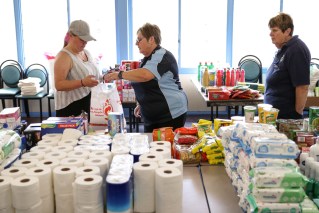With overseas trips off the cards, here are five ways to reinvest your travel funds


People who normally go overseas every year could use the extra cash to pay off some debt.
Border closures are likely to restrict international travel for Australians until at least July 2022.
That was one of the main assumptions in the May federal budget and it means a large group of people, having squirrelled into their savings what they usually spend on overseas holidays, have more cash today than they did before the pandemic.
If you’re fortunate enough to fall into that category, then you’re perhaps asking yourself or your financial adviser what you should do with the extra savings.
Crystal Wealth Partners director Louise Lakomy has five suggestions.
1. Build up your high-interest savings
There’s a big difference between the lowest and highest savings rates on the market, so it pays to shop around.
According to consumer comparison site Canstar, the average base savings rate is 0.20 per cent, while the highest available rate including bonus interest is 1.35 per cent.
To put that into perspective, let’s assume you have $20,000 in savings.
If your bank was paying 0.20 per cent interest, you would only earn $40 in pre-tax interest over the course of 12 months.
But if your savings rate was 1.35 per cent, you would earn $270.
Ms Lakomy said chucking your pandemic savings into a high-interest account was an appropriate option for younger Australians saving for their first home.
2. Pay off your mortgage
Although minimum mortgage repayments have fallen in line with successive RBA rate cuts, Ms Lakomy recommends using any pandemic windfalls to pay off debt.
Doing so will help you pay off your home loan much sooner and will consequently save you money over the life of the loan.
Investing in the sharemarket could deliver a higher return, but the economic outlook is uncertain and reducing your liabilities will offer some peace of mind.
Ms Lakomy said it was also important to note that mortgage repayments on your home are not tax deductible.
3. Sacrifice salary into super
People of all ages can make additional repayments into their superannuation to build a larger nest egg for retirement – and doing so will help lower your tax bill.
Members can make $27,500 in ‘concessional’ and $110,000 in ‘non-concessional’ contributions every year as of July 1, 2021.
Concessional contributions are taxed in your super fund at a rate of 15 per cent – which for most people is much lower than their marginal tax rate.
They include compulsory employer contributions, salary sacrifice payments, and personal deductible contributions that you can claim as a tax deduction.
4. Minimise superannuation drawdown
The federal government requires superannuation funds to pay members in their pension phase a minimum amount every year based on their age.
These are often referred to as the minimum pension drawdown rates.
As a result of the pandemic, the federal government halved these rates so that retirees would not have to draw down too much of their superannuation at a time when asset prices had fallen.
The federal government has extended the measure until July 2022, and Ms Lakomy recommends retirees take advantage of it so that they can keep more of their money in super to generate extra returns.
5. Invest in the sharemarket
Global shares returned a stunning 28 per cent in Australian dollar terms over the past financial year, as rock-bottom interest rates and government spending fuelled a remarkable turnaround.
Such high returns are unsustainable, but Ms Lakomy said gaining some exposure to the sharemarket makes sense if you have a longer-term investment timeframe.
A good way to invest in shares is through a managed account or an exchange-traded fund (ETF).
This is because, like super funds, they allow you to buy a range of different assets and shares in a single trade, which means you can diversify your portfolio without having to spread your money across lots of different investments.
The New Daily is owned by Industry Super Holdings








